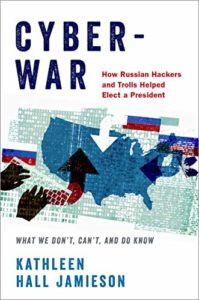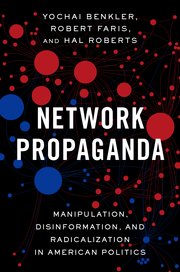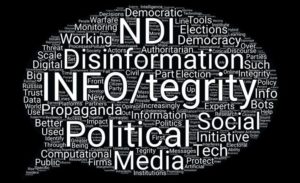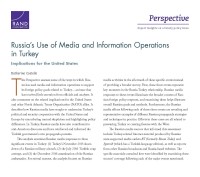 McAfee, a more than 30-year old company traditionally known for is anti-virus software, just became the latest cybersecurity firm to release research into the spread of false information that could influence elections, tech policy reporter Cat Zakrzewski writes for The Washington Post:
McAfee, a more than 30-year old company traditionally known for is anti-virus software, just became the latest cybersecurity firm to release research into the spread of false information that could influence elections, tech policy reporter Cat Zakrzewski writes for The Washington Post:
Earlier this year, FireEye, another California cybersecurity company, helped Facebook identify an influence operation with ties to Iran. The company’s report highlighted how the adversaries were more expansive than the disinformation campaigns previously seen from Russia and showed other foreign actors were building on the Kremlin’s playbook. Some start-ups — including New Knowledge and ZeroFox — are specializing in detecting the spread of disinformation on social media. Both companies have raised large funding rounds from venture capitalists, underscoring the market interest in such technology.
 The Fight Against Disinformation in the U.S.: A Landscape Analysis is a map of the disinformation initiatives currently in play to undergird newsrooms and improve media literacy at a challenging moment for free media, note Heidi Legg, Director of Special Projects at the Shorenstein Center and Harvard College senior Joe Kerwin. Universities, platforms, foundations, and private donors are all working to understand how a contagion spreads in this viral digital culture and to discover potential solutions, they write for the Harvard Kennedy School’s Shorenstein Center.
The Fight Against Disinformation in the U.S.: A Landscape Analysis is a map of the disinformation initiatives currently in play to undergird newsrooms and improve media literacy at a challenging moment for free media, note Heidi Legg, Director of Special Projects at the Shorenstein Center and Harvard College senior Joe Kerwin. Universities, platforms, foundations, and private donors are all working to understand how a contagion spreads in this viral digital culture and to discover potential solutions, they write for the Harvard Kennedy School’s Shorenstein Center.
In an effort to discover who is stepping up, what they are doing and where they are making early headway, the work is organized into four categories:
- Internal Platform Efforts
- Institutional Initiatives
- Upstart Initiatives
- Leading Funders
“Post-truth” information pollution
 How does the public sphere become vulnerable to varieties of “post-truth” information pollution, Yochai Benkler, Robert Faris, and Hal Roberts ask in Network Propaganda: Manipulation, Disinformation, and Radicalization in American Politics, (Oxford University Press, 2018).* Analysis limited to how technology operates “understates the degree to which institutions, culture, and politics shape technological adoption and diffusion patterns,” say the authors, associated with Harvard University’s Berkman Klein Center for Internet and Society.
How does the public sphere become vulnerable to varieties of “post-truth” information pollution, Yochai Benkler, Robert Faris, and Hal Roberts ask in Network Propaganda: Manipulation, Disinformation, and Radicalization in American Politics, (Oxford University Press, 2018).* Analysis limited to how technology operates “understates the degree to which institutions, culture, and politics shape technological adoption and diffusion patterns,” say the authors, associated with Harvard University’s Berkman Klein Center for Internet and Society.
Around the world, defenders of democracy are working to understand and respond to the ways that technology is impacting political and electoral processes, writes Kip Wainscott, a senior advisor at the National Democratic Institute, a core institute of the National Endowment for Democracy.
 In recent months, a collection of stakeholders and advisors from democracy organizations, academia, journalism, and tech and data backgrounds have developed an approach for effective collaboration, coordination and advocacy called the Design 4 Democracy Coalition, to be launched in London this week. The D4D Coalition’s mission is to ensure that technology and social media work to better support democracy and human rights globally, in a coordinated effort to navigate tech-enabled challenges with the following priorities, adds Wainscott, who leads NDI’s presence in Silicon Valley:
In recent months, a collection of stakeholders and advisors from democracy organizations, academia, journalism, and tech and data backgrounds have developed an approach for effective collaboration, coordination and advocacy called the Design 4 Democracy Coalition, to be launched in London this week. The D4D Coalition’s mission is to ensure that technology and social media work to better support democracy and human rights globally, in a coordinated effort to navigate tech-enabled challenges with the following priorities, adds Wainscott, who leads NDI’s presence in Silicon Valley:
- Surfacing country-level insights and escalating concerns from around the world to better track the ways that technology is impacting democracy, and to inform smarter responses to challenges like digital disinformation, computational propaganda, and cybersecurity threats;
- Coordinating support for the development of programs, research methodologies, and civic tech interventions to help mitigate threats and promote the integrity of democratic governance and political processes; and
- Advocating for democracy as a core design principle for technologists and industry leaders, and working collectively to promote a wider understanding of the value of strengthening and supporting democracy around the world.
Early pilot projects include:
- Promoting cybersecurity among political stakeholders: In August, the D4D Coalition supported a training workshop for ruling and opposition parties across the Southern African Development Community region to raise awareness of cybersecurity threats and risk mitigation techniques. Moreover, in Eastern Europe, coalition partners a convened training-of-trainers on sophisticated cybersecurity assessment and mediation methodologies that will enable future audits of at-risk political parties and civic organizations across the post-Soviet region.
 Combatting disinformation on encrypted messenger services: Through its industry partnerships, the D4D Coalition is supporting tw in the development of a fact-checking chatbot (CoFacts) as a means of crowdsourcing information about Chinese disinformation being spread in Taiwan on the popular messaging app, LINE. …..
Combatting disinformation on encrypted messenger services: Through its industry partnerships, the D4D Coalition is supporting tw in the development of a fact-checking chatbot (CoFacts) as a means of crowdsourcing information about Chinese disinformation being spread in Taiwan on the popular messaging app, LINE. …..- Monitoring and reporting online incidents in connection with the referendum in Macedonia: In advance of Macedonia’s nationwide referendum, held on September 30, 2018, the D4D Coalition sent representatives to the field to conduct assessments on the social media environment …. The Coalition has partnered with Graphika to conduct a social media network analysis around key disinformation issues and established a channel to provide local context to representatives at Facebook and Twitter regarding incidents on their platforms.
The coalition invites all democrats and technologists to join this cause to advance democracy, both as an essential value and as a design principle.
 In “Russia’s Use of Media Operations in Turkey: Implications for the United States,” RAND analyst Katherine Costello examines Russia’s media responses to three events: Turkey’s November 2015 shoot-down of a Russian military plane, the July 2016 Turkish coup attempt, and the December 2016 assassination of the Russian ambassador. Her paper highlights the Kremlin’s “amplification of genuine uncertainty” with false claims, “opportunistic fabrications,” and “multiple contradictory narratives” for different audiences, concluding with a discussion of implications for the US State Department’s Global Engagement Center and NATO’s Strategic Communications Centre of Excellence.*
In “Russia’s Use of Media Operations in Turkey: Implications for the United States,” RAND analyst Katherine Costello examines Russia’s media responses to three events: Turkey’s November 2015 shoot-down of a Russian military plane, the July 2016 Turkish coup attempt, and the December 2016 assassination of the Russian ambassador. Her paper highlights the Kremlin’s “amplification of genuine uncertainty” with false claims, “opportunistic fabrications,” and “multiple contradictory narratives” for different audiences, concluding with a discussion of implications for the US State Department’s Global Engagement Center and NATO’s Strategic Communications Centre of Excellence.*
*HT: Bruce Gregory at George Washington University’s Institute for Public Diplomacy and Global Communication.







